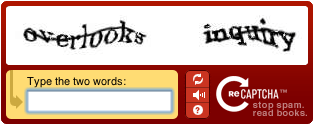
SEOs can occasionally be found guilty of the following on a regular basis:
- Rankings
- Links
- Algorithms of Zoo kind that Google so lovingly provides
As the job of SEOs continues to become broader, requiring a greater number of skill sets and a level of expanding knowledge, user experience is something we can all work on improving, right? Surely if we focus some of our energy on boosting the experience, the result will benefit us with much happier users, which in turn will result in higher conversion rates.
There are a number of ways to work on improving user experience, and of course, conversion rate optimization also has a part to play. Today, we would like to focus on one specific part of user experience — CAPTCHAs (Completely Automated Public Turing test to tell Computers and Humans Apart) — and we’ll be talking about how they can inadvertently kill your website ratings.
CAPTCHAs ask you annoying questions
When you encounter a CAPTCHA, you are essentially being asked the question, “Are you a robot?”. We understand why CAPTCHAs are there, we honestly do, but quizzing people the first time they try and enter your site is rather counterproductive, it’s like walking up to a customer who is about to enter a physical store and asking them “Are you a thief?”. Doing this even before you allow them to walk through the door, they won’t want to anymore. You’ll probably receive a strange look and a quick shuffle away. We used to flood customers with “questions” similar to this:
And we now offer them somewhat easier CAPTCHAs:
CAPTCHAs are the barrier between you and your customers
Fact: With CAPTCHAs turned off on a website, the company’s conversion rate would increase by up to 3.2%. It’s worth noting that the CAPTCHA type used when conducting this test was based on the more traditional word format. That 3.2% is a pretty big potential gain for a whole lot of companies, for example, if you attract 1 million visits a year that’s an extra 32,000 potential customers.
CAPTCHAs are not the solution, they have become the problem
At the beginning of 2013 it was announced that Ticketmaster was finally ditching its traditional CAPTCHAs, having probably noticed the trouble that people can face when entering the website. Ticketmaster proceeded with an alternative system by SolveMedia; a system that presents users with an image or video, with the user having to type a phrase associated with that image. In the video version, a descriptive phrase will appear which the user then has to copy into a box below. If you’re not willing to complete this process, you’ll need to watch the video for a certain amount of time (which has similarities to YouTube advertising) before continuing.
Companies have begun producing variations of novelty products aimed at helping us to stop spam from landing in our inboxes. Many products claim that they are aimed at ‘improving the user experience by making this easier for humans’. They come in a variety of styles, from something as easy as completing a simple calculation problem.
What you must remember is that all of these “solutions” all lead to the same problem. Us, as the users, are trying to complete a purchase on various websites, complete a form or even something as basic as submitting a comment on an article/video, and the website is preventing us by doing this by putting up frustrating technological barriers between ourselves and our goal. All of this is to prevent us from experiencing spam… Logical?
Another major concern for users is that the products aren’t particularly user-friendly to blind or partially sighted visitors. A prime example of this is the story of CAPTCHAs preventing the blind from signing a petition to help the blind. Some offer audio CAPTCHAs, which are a better alternative, but again, isn’t helpful for the hard of hearing or the deaf.
CAPTCHA is built for advertising, not users
The key difference is with image-based products such as SolveMedia is that they seem to act as just another opportunity to push an advert in front of users. In some cases they can force the user to watch an advert just to progress to the next page, which after a few times can be incredibly tiresome.
Users don’t want to see adverts even when they are “subtly” placed around a beautifully designed page. Overloading consumers with too much media can drive them away from your site. More and more we are moving away from giving the user a choice about viewing an advert to the point where adverts are forced upon them (a certain video website comes to mind.)
People surely must be ditching CAPTCHA… right?
Despite statistics, the fact is the use of CAPTCHA is actually on the increase and we can’t see the logic behind it. Perhaps for many webmasters using CAPTCHA is just becoming common practice, almost the norm. After all, it’s a quick fix that means webmasters no longer have to worry about dealing with ‘spam’.
“CAPTCHAs are designed to be easy for humans but hard for machines”
This is according to a study carried out by Stanford University into the use of CAPTCHA by humans. Yet, by carrying out tests on more than 1,100 people, gathering 11,800 completed surveys, and studying 14,000,000 samples from a week’s worth of data from eBay, they revealed how difficult CAPTCHAs have become for humans.
The study showed that, on average:
- Visual CAPTCHAs take 9.8 seconds to complete
- Audio CAPTCHAs take much longer (28.4 seconds) to hear and solve
- Audio CAPTCHA has a 50% give-up rate
- Only 71% of the time will 3 users agree on the translation of a CAPTCHA
- Only 31.2% of the time will 3 users agree on the translation of an audio CAPTCHA
So what is the solution?
There is a time and a place for CAPTCHA, companies need to note this. For some sites, it may be unavoidable, but for others it isn’t necessary to overload the consumer with various access points when trying to do something simple like commenting on a blog. However, any solution that is extremely effective throughout the internet becomes widely used, and subsequently becomes a target for hackers.
There are some really simple solutions already out there that will help to reduce the amount of spam you receive but won’t interfere with your user experience.
Akismet
Akismet provides an effective defence system that has pretty much no impact upon your users. It comes as a plugin and it’s generally easy to implement on your site, regardless of build. Akismet activelty monitors millions of sites, constantly learning new methods of spam to beat comment spam.
The Honeypot Technique
Essentially, the honeypot technique is used to hide a field on a form from the user. If this field is filled in as a result, the chances are pretty high it was by a machine and not a human user. The major downside to this method is that the form could be accidentally completed by a visually impaired user as they could think it’s a form for all users to fill in. Therefore, it could be useful to label the field with “If you are human, don’t fill in this field” or something along those lines.
Ultimately we face the problem that whatever we do to ensure a human user doesn’t fill in the form, a malicious script could perform its own interpretations of the field and by learning which labels mean, they will leave the field alone.
The key benefit to this method is that the user isn’t getting punished by the website by being asked/required to complete a form or a question that is irrelevant to their actions.
Is it time you ditched your CAPTCHA?
We think we all need to focus on what creates a better experience for users by asking ourselves the following questions:
- Is the amount of spam you are receiving really worth potentially losing conversions?
- If the answer is yes, is your CAPTCHA friendly to all users, including those who are visually impaired (audio obviously kind to the deaf community)?
- CAPTCHAs are for robots, not for humans. Anything one person can code to try and prevent robots from entering a site is something another can find a way through, that’s just how it is. The real consideration is, are we just shoving our problem with spam onto our customers instead of admitting that it’s a hard battle to face?
When it comes down to it, CAPTCHAs lead to a negative experience on our sites. They frustrate users, damage conversion rates for sites worldwide, and they are not particularly friendly to visually impaired users which is unfair. Most of all, it is shifting our problem onto users. Getting rid of CAPTCHAs will not only improve users’ experiences, but it will improve the web as a whole. Hopefully, the beginning of the end of the CAPTCHA is near. If you have a CAPTCHA, I urge you to remove it now!
- Social Media Marketing – In Reality - November 28, 2024
- How to Manage Your Digital Marketing and PR During a Christmas Closure - October 22, 2024
- Understanding Strategy – Beyond the Buzzword - October 22, 2024



